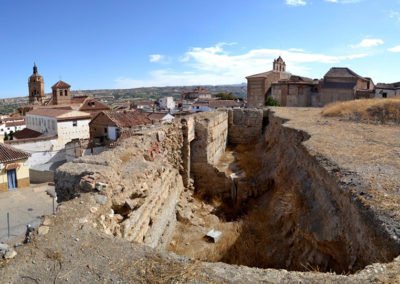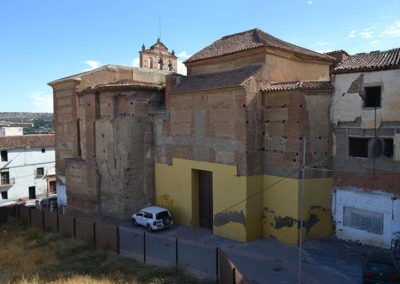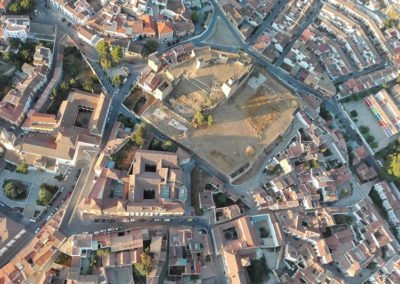Guadix, Granada (Lot 4)
The place
The city of Guadix is located in the Northern slope of Sierra Nevada, in the area known as Hoya de Guadix: a natural valley of a total extension of 500 squared metres, shaped by the basins of the rivers Fardes and Guadix. It holds a total population of about 19.000 inhabitants and is one of the most important population centres within the region which is divided into 32 municipalities. It is the headquarters of the judicial district and of the Diocese of Guadix-Baza.
It is erected in a privileged enclave which was once the main crossroads of the paths of Eastern Andalusia because of its condition of being the natural border between the Eastern part of the Peninsula and Andalusia.
It has a mountainous terrain, dominated by the old centre of the town, located at its maximum elevation, on a hill with steep slopes. The population spreads towards the South via the neighbourhood of Las Cuevas, characterized by it being a sum of cave-type sort of settlements, and towards the North-East via the existence of new urban developments, reaching beyond the course of the river Guadix, heading towards the railway station of the city.
Gallery of images
The proposal
Retrieval and Improvement of the Area of the Citadel of Guadix, Granada (Lot 4)
With this proposal, the aim is to retrieve one of the two key areas of the historic city. The retrieval of the surroundings of the citadel, the restitution of the traditional houses in a state of ruin within it and the rehabilitation of the Palace of the Saavedra family, which was also the former seminar, are all a long-held ambition of the population which has its complete approval and counts with a series of previous works sufficient to make it possible. These interventions will enable improving the urban scene, conserving the buildings and revitalizing the environment which is a key historic and landscape landmark of the city with which many people from the area feel a deep connection to.
Currently, the archaeological works of excavation within the enclosure of the fortress are being carried out. Until today it had been covered with filling material and its platform had been used frequently as a leisure and sports area linked to the former seminar. With this intervention, the aim is to incorporate this area to the cultural and leisure activities within the municipality. This area, as well as the area of the wall as well which is in the middle of a restoration process, will remain excluded from the area of action of the Competition, leaving its treatment to one side -for the moment- until the results of the execution of these actions are a fact.
Thus, the proposal includes the following interventions:
1. Urban adjustment of the exterior access located on the East side of the Citadel, as well as of the adjacent open public areas and its road network located around its perimeter.
The first proposal is to retrieve the exterior access located at the east of the Citadel by means of the incorporation to the network of public spaces the plots of land which currently impede this (the majority of them are empty plots of land and two of them have constructions which will be demolished). The proposal must also include the road network and the Plaza de Pedro de Mendoza, which can also be subject to being remodelled. Likewise, the existing commemorative bust may be replaced somewhere else in pursuit of a better perception of the monument and the urban scene.
2. Transforming the former Palace of the Saavedra family and later on minor seminary into a hotel-parador or another similar sort of use, and church.
The proposal is to retrieve and adjust the built bodies of greater architectural interest of the former palace, allowing to eliminate or substitute the contemporary services and added elements with the ultimate aim of reusing it as a hotel-parador or the like. Regarding the church, its exterior adjustment must be taken into account and alternative uses or complementary ones may be suggested.
3. Functional and formal restitution of the residential block in a current state of ruin.
The idea is to retrieve the degraded block, going back to its former residential use which goes according to the characteristic scale, volume and materials of the traditional constructions of the historic complex, with the aim not only to revitalize the area but also as a model or guideline for other future interventions of this nature. The majority will be destined for single-family housing or tourist accommodation.















